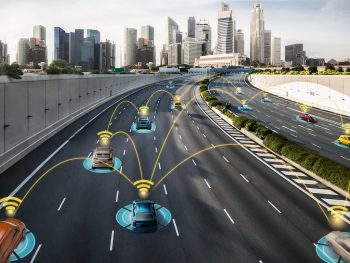Election delays to Automated Vehicles Bill would ‘leave Britain in the slow lane’
The UK automotive sector has called for the swift passing of vital legislation on autonomous vehicles to unlock a multi-billion-pound self-driving revolution.

Backing the AV Bill now is fundamental if Britain is to develop and deploy self-driving passenger cars and services
The Automated Vehicles Bill was announced in the King’s Speech in November 2023 and could save an additional 3,200 lives and prevent 53,000 serious accidents, from now until 2040, with a potential £38bn economic boost too – but only if the Bill is enacted without delay.
The Society of Motor Manufacturers and Traders (SMMT) says the legislation must be acted on now, as leaving it until after the general election would leave the UK behind on the rollout of self-driving technology.
Even if the current timetable is met, following the Bill’s second reading in the House of Commons in early March, we are unlikely to see self-driving vehicles on British roads until at least 2026.
But delays from a general election could put this back to around 2030, leaving the UK behind.
Rival markets in the EU and US already have regulatory frameworks in place and have captured the lead, deploying the tech on public roads now – and this makes the need for our own legislation even more urgent.
Speaking today at SMMT Connected 2024, a major automotive event exploring the future of personal mobility and mass transport, Mike Hawes, SMMT chief executive, said: “Backing the AV Bill now is fundamental if Britain is to not only develop but deploy self-driving passenger cars and services.
“We have the foundations, but other major markets are stealing a march, with regulation already in place allowing them to benefit from UK-developed self-driving tech that cannot be rolled out here.
“Any further delay risks leaving Britain in the slow lane, jeopardising our competitiveness and holding back the significant safety and economic rewards self-driving technology can deliver.”
Exclusive YouGov research commissioned by the SMMT indicates keen demand from drivers for self-driving services. Nearly a third of adults (29%) would use an automated passenger service if available today, with one in four (26%) likely to try self-driving features in a personal car – even though they have yet to experience the technology.
The poll also found that young people are even keener, with Generation Z (18–27-year-olds) almost twice (34%) as likely to try a personal car with self-driving features than Baby Boomers (18%) (60–78-year-olds).
Reduced stress of driving, safer journeys and potentially lower insurance costs were listed as the top three benefits of a self-driving car. For self-driving passenger services such as a bus, shuttle or taxi, consumers were most motivated by the prospect of lower fares, better availability in rural areas and safer journeys.
Automated Vehicles Billautonomous carsSociety of Motor Manufactures and Traders (SMMT)












